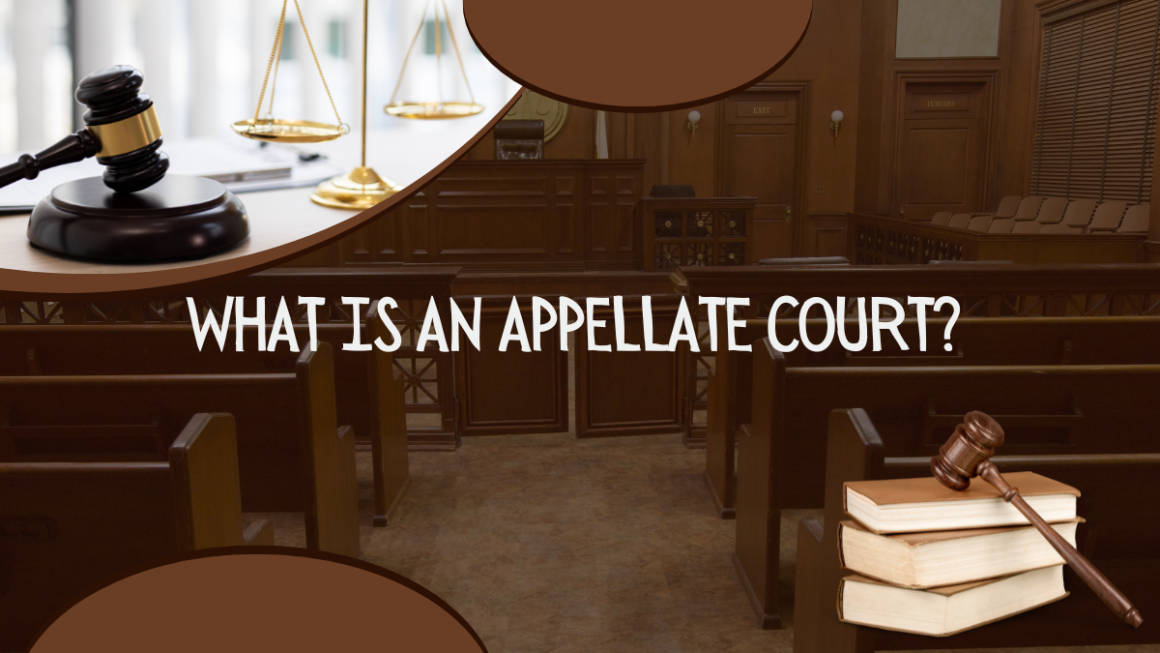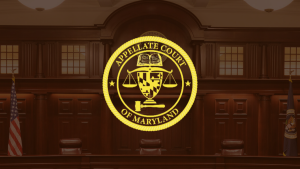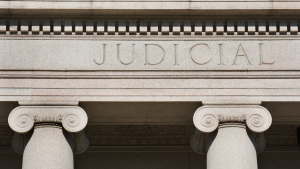What is an appellate court? An appellate court is like a judge team that checks if other judges made fair decisions in smaller courts. They look at those decisions to make sure everything is fair and okay. Let’s learn more about appellate courts in this article.
Unlike the first judge teams that listen to stories and decide what’s right, the second judge teams don’t look at the stories again. They just check if the first judge teams did things correctly and don’t listen to new information.
The second judge team, called an appellate court, has an important job. They check if the first judge team followed the rules and used the right laws when making decisions. Envision it resembles playing a game, and the subsequent judge ensures everybody is playing by similar principles to be fair. This helps ensure that the law is applied the same way for everybody and that things are fair in the legitimate world.
Before delving into the jurisdictions of an appellate court and examining its role in the legal system, let’s first address the primary question: “What is an appellate court?”
What is an appellate court?
Have you ever wondered “What is an appellate court?” Think of the appellate court like a big ladder in the legal world. It’s higher up than the first judge teams and has different levels, like the top step being the most important. The very top step is called the court of last resort, kind of like the boss of all the judge teams. This top step can make big decisions about money and set examples that the lower steps have to follow.
When it’s time for the second judge team to look at a case, they don’t have just one judge, but a group of them, like a team. This team checks what the lawyers are saying and looks at what happened in the first judge team’s decisions. They care a lot about understanding and using the laws correctly, rather than finding out new facts about the story. The lawyers also write down their important points, and sometimes they talk in front of the judge team to explain things.
When the superior judge team makes a decision, the lower judge teams have to follow a rule in their area. And what the boss judge team decides can be like a big example for other cases in the future. It’s important because it helps everyone make fair decisions and keeps the rules steady.
What is the role of appellate courts in the judicial system?
After learning about “What is an appellate court?” Let’s explore its role in the judicial system. The judge teams that check the other judge teams play a really important role. They look at what the first judge teams decide to make sure everything is fair and follows the rules. If there’s a mistake, these second judge teams can fix it. This helps keep the legal system working well and fair for everyone.
- Review of lower court decisions
- Hierarchical structure
- Panel of judges
- Precedent setting
- Check on legal errors
Review of lower court decisions:
Appellate courts, also known as the judge teams, play a crucial role. So, what is an appellate court? Their task involves reviewing the decisions made by the initial judge teams, without reexamining the facts or entertaining new stories. Instead, their focus is on ensuring that the first judge teams applied the correct rules and interpreted the laws accurately.
Hierarchical structure:
Think of appellate courts as a multi-level tower. So, what is an appellate court? The top floor, comparable to the boss floor, is called the court of last resort, like the Supreme Court in the United States. There are also lower floors, at state or federal levels. The higher floors have the authority to make crucial decisions that carry widespread significance. This tower structure aids in maintaining organization when judges are reviewing decisions.
Panel of judges:
When reviewing a case, it’s not just one judge but a team, much like a group effort. So, what is an appellate court? This team, referred to as justices or appellate judges, typically consists of three or more members. They scrutinize the arguments presented by the lawyers, examine crucial documents, and sometimes listen to the lawyers speaking in person. The collaborative effort aids them in gaining a better understanding of the legal intricacies involved.
Precedent setting:
When the judges make decisions, it’s akin to establishing crucial rules that everyone must adhere to. So, what is an appellate court? These rules serve as a guidebook for other judge teams when deciding similar cases in the future. It ensures consistency in the rules and promotes fairness for everyone involved.
Check on legal errors:
The boss judge teams, called appellate courts, are like the superheroes who make sure the other judges didn’t make any mistakes or play favorites. If someone thinks there’s a problem with how the first judge team decided, they can ask the boss judge teams for help. This superhero system makes sure the legal system is fair and everyone can trust it.
How does the appellate process work, and what are its key components?
Imagine the legal system as a big puzzle. The appellate process is like the part where we double-check if the puzzle pieces fit together correctly. If someone thinks there’s a mistake in the puzzle, they can ask the boss puzzle-checkers to take a look. This helps make sure everything is done right and teaches us how to solve future puzzles better.
- Filing the notice of appeal
- Appellate jurisdiction
- Record on appeal
- Appellate briefs
- Oral arguments
- Appellate decision
- Enforcement of appellate decisions
Filing the notice of appeal:
Imagine you’re playing a game, and you don’t agree with a decision made by the referee. To say you want to talk about it, you’d send a special letter to the boss. This letter is like a notice of appeal. It tells the boss, referee and everyone else that you’re not happy with the decision and want to discuss it more. But just like in games, you have to send this letter really quickly; otherwise, you might not get the chance to talk about it anymore.
Appellate jurisdiction:
Think of appellate courts as specialized clubs exclusively handling specific types of cases. So, what is an appellate court? They can’t address every problem, only specific ones. It’s crucial to know which club to approach because they must be capable of resolving the exact kind of issue you’re facing. It’s akin to going to the soccer club for a soccer problem and the chess club for a chess problem.
Record on appeal:
The record on appeal functions like a superhero file, containing all the essential documents and discussions from the first judge team’s proceedings. So, what is an appellate court? The appellate judges, utilize this superhero file to assess whether the first judge team followed proper procedures or if any errors occurred during the proceedings.
Appellate briefs:
During significant courtroom disputes, lawyers draft specific documents known as appellate briefs. So, what is an appellate court? These papers serve as superhero letters, elucidating the issues, each side’s perspective, and the reasons behind their belief in being correct. It’s akin to attempting to persuade the judge team with written arguments. These superhero letters play a crucial role as they aid the judges in gaining a better understanding of the entire situation.
Oral arguments:
When the superhero lawyers want to talk directly to the judges, they get a chance in a special talking session called oral arguments. It’s like a mini-meeting where they can explain things better, answer questions from the judges, and highlight the important points from their superhero letters. This helps make sure the boss judge team really understands what’s going on.
Appellate decisions:
After looking at the superhero file, the talking letters, and hearing what the superhero lawyers have to say, the judges write down their final decision. This paper explains how they see the problem and what they think should happen. It’s like saying if the first judge team was right or if they need to think about it again. This decision is really important because it becomes a rule that everyone follows in similar cases later on.
Enforcement of appellate decisions:
After the judges determine the course of action, it’s akin to providing instructions to the first judge team. So, what is an appellate court? The first judge team is obligated to adhere to these instructions, which could involve specific actions or reconsidering the case with the new judge’s decision in mind. It ensures that everyone pays heed to the directives set forth by the judges.
What are the primary functions of appellate courts in legal proceedings?
Appellate courts have very important jobs in the legal system. They check the decisions made by the first judge teams to make sure everything is fair and follows the rules. Knowing what these judges do helps us see how they play a big part in making and explaining the laws.
- Error correction and legal accuracy
- Interpretation and application of law
- Setting legal precedent
- Ensuring fairness and due process
- Resolution of legal disputes
- Supervision of lower courts
Error correction and legal accuracy:
Appellate courts have an important job: fixing mistakes that might have happened in the first judge teams’ games. They look really carefully at everything that happened in the game, like what people said and the rules they used. The judges want to make sure the first judge teams understood and followed the rules correctly, so everything is fair and just.
Interpretation and application of law:
Appellate courts have wise leaders who help explain and use the rules in the legal game. When they decide things, it’s like setting examples for the other judge teams on how to understand and use the laws. This helps everyone make decisions in the same way, making sure the rules are the same for everyone playing the game.
Setting legal precedent:
When judges make choices, it’s like creating important rules that everyone has to follow later. These rules help other judge teams decide similar cases in the future. It’s like making sure everyone plays the game with the same rules, so it’s fair and everyone knows what to expect.
Ensuring fairness and due process:
Think of appellate courts judges as superheroes who make sure everything is fair in the legal game. They check how the first judge teams played the game to make sure everyone got a fair turn and that nobody was treated unfairly. This superhero job is super important because it keeps people trusting that the legal system is fair and just for everyone.
Resolution of legal disputes:
Imagine appellate courts as superhero meeting places where people unhappy with the first judge’s decision can go to talk about it. It’s like a special gathering where everyone discusses the problems, and the judges make a final decision. This superhero team helps solve arguments fairly and gives a clear answer to the legal questions, making sure everything is settled.
Supervision of lower courts:
Think of appellate courts as the superhero bosses of the first judge teams. They make sure the first judge teams are playing by the rules and being fair. This superhero checking helps make sure the legal game is done well and that everyone follows the rules. It’s like having a superhero boss to make sure everything is fair and square.
What is the jurisdiction of appellate courts, and how does it influence their decisions?
Think of appellate courts like special clubs that can only deal with certain kinds of cases. They can’t handle every problem, just specific ones. Knowing what these clubs can and cannot do is really important because it helps keep things organized and fair when they’re making decisions. It’s like making sure everyone goes to the right club to solve their problems.
- Subject matter jurisdiction
- Finality of decisions
- Reviewing legal questions
- Precedent setting within jurisdiction
Subject matter jurisdiction:
The appellate courts are like expert teams for different kinds of problems. Each team is really good at solving certain types of issues. For example, one team might be great at soccer problems, and another at chess problems. This way, the experts know a lot about the specific kind of problem they’re solving. It helps make sure the right team of experts looks at each case and understands it really well.
Finality of decisions:
Think of appellate courts like superhero judges who, once the first judges make a decision, don’t go back and change the story. Instead, they check if the first judges used the right rules and understand the laws correctly. The superhero judges’ choices are like the final decisions everyone has to follow. This superhero rule-making helps keep the legal system steady and makes sure everyone plays by the same rules.
Reviewing legal questions:
Appellate courts are like expert judges who don’t argue about what really happened but focus on whether the first judges understood and used the right rules. Instead of checking facts, they look at the laws and decide if there were mistakes in how the first judges used them. This expert team is like the rule-checkers, making sure everyone follows the right laws in the legal game.
Precedent setting within jurisdiction:
When judges make choices in a certain place, it’s like making important rules everyone has to follow. These rules help other judge teams decide similar cases in the future. It’s like having a guidebook that keeps the rules the same for everyone, making sure the legal game is fair and makes sense.
What makes appellate courts significant?
Appellate courts are like expert judges with a special job in the legal world. They help make sure the rules are fair and the same for everyone playing the game. These expert judges do things like creating examples for other judges to follow, making sure everyone understands and uses the rules correctly. They’re like superheroes making sure everything is fair and just for everyone.
- Legal precedents and consistency
- Interpretation and clarification of laws
- Adaptation to evolving societal values
- Judicial precedent and stability
- Resolution of complex legal issues
Legal precedents an consistency:
Appellate courts, which are like expert judges, help create important rules by making decisions. These rules guide other judges in similar situations, so everyone plays by the same fair rules. It’s a bit like having a superhero team of judges that makes sure the legal game is stable and everyone knows what to expect.
Interpretation and clarification of laws:
Think of appellate courts as special judge teams that help explain and understand laws better. They make important choices that help everyone, like lawyers and other judges, know exactly what the rules mean. It’s like having superhero judges who use their special knowledge to make sure everyone understands and follows the laws correctly.
Adaptation to evolving societal values:
Appellate courts, kind of like wise judge teams, help make sure the rules keep up with how our society changes. If people think differently about things, these judge teams might explain the rules in a new way or even make new rules to fit what people believe is right. It’s like having judges who can adjust the rules so they always make sense and match what people care about in their communities.
Judicial precedent and stability:
When special judge teams, called appellate courts, follow the rules and examples from the past, it helps keep the legal game steady. They look at what happened before and make sure everyone sticks to those rules. This is really important because it means the decisions are not random, but based on what was decided before and what everyone expects. It’s like making sure the legal game is fair and makes sense.
Resolution of complex legal issues:
Imagine appellate courts as superhero judge teams. They’re like the experts who deal with tricky and new problems in the legal world. When they make choices, it’s like giving advice to everyone on how to handle these tricky issues. This superhero judge team helps figure out what to do when the rules aren’t clear or when something new comes up in the legal game.
What challenges and complexities are associated with appellate court cases?
Think of appellate court cases like tricky puzzles for judge teams. These puzzles are more challenging than the ones in regular court games. The judge teams have to figure out special rules, follow detailed steps, and use clever ways to talk about the case. It’s like a superhero challenge for judges that needs extra thinking and skill.
- Legal complexity and nuanced issues
- Limited scope for factual review
- Strategic decision-making in case selection
- Appellate advocacy skills
- Navigating procedural rules
- Establishing legal precedent
- Limited time for oral arguments
Legal complexity and nuanced issues:
Think of appellate court cases like advanced levels in a legal game. The lawyers, like superheroes, need to understand tricky rules and past examples really well. They have to use clever strategies to explain their case to the special judge teams who are experts in the game. It’s like a super challenging level where everyone needs to be extra smart and careful.
Limited scope for factual review:
Picture appellate courts as special judge teams who don’t look back at the details of what happened in the first judge teams’ game. They don’t listen to new stories or check if people are telling the truth again. So, if someone wants to change the first judge teams’ decision, they have to show that the first judges didn’t use the right rules, not that the facts are different. It’s like a rule that says you can’t ask the judge teams to hear the same stories over and over.
Strategic decision-making in case selection:
Deciding if a case should go to the next level, like a legal superhero challenge, is like playing a smart game. The lawyers have to think about if they can win, how important the rules are, and what it might mean for future games. It’s like choosing the best moves in a game where every choice is super important.
Appellate advocacy skills:
Being a good lawyer for the special judge teams needs special skills. These lawyers have to be really good at finding important legal information, writing persuasively to explain their case, and talking well in front of the judge teams. It’s like being a superhero with unique powers to make sure the judge teams understand and agree with them.
Navigating procedural rules:
Think of appellate court cases like playing a game with strict rules and a timer. The lawyers, who are like legal superheroes, need to be really careful and follow all the rules on time. If they don’t, their appeal might get canceled, making it more challenging for them to have a second chance. It’s like playing by the game’s rules so everyone has a fair shot.
Establishing legal precedent:
Appellate court decisions can make important rules that affect other cases later. The lawyers, who are like legal superheroes, not only have to help their clients but also think about how their case might change the rules for everyone. It’s like playing a game where every move can create new rules for others to follow, making it a bit trickier for the superhero lawyers.
Limited time for oral argument:
In oral arguments lawyers get a chance to talk to the judge teams. But there’s a time limit, like a ticking clock. The superhero lawyers need to be quick and smart, sharing their important points and answering judge questions in a short time. It’s like a speedy talk where they have to use their time wisely to convince the judges.
How do legal precedents and appellate decisions interact and shape the legal landscape?
Think of legal precedents and appellate decisions like puzzle pieces that fit together. They work together to shape the rules in the legal world. Seeing how they connect helps us understand how the rules are explained, used, and improved as time goes on. It’s like watching a puzzle come together to make the legal game better.
- Guidance for lower courts
- Interpretation and application of laws
- Evolution of legal doctrines
- Precedent as persuasive authority
- Challenges to precedent
- Impact on legal practice and advocacy
Guidance for lower courts:
Legal precedents function as special rules established by significant judges. So, what is an appellate court? When regular judges encounter similar issues, they refer to these special rules to determine what is fair. It’s akin to having a guidebook that instructs, “Follow these rules when the problem is like this.” This ensures uniformity in decision-making among all judges, fostering fairness and providing clarity on what to expect in the legal game.
Interpretation and application of laws:
Appellate decisions serve as crucial guidebooks for comprehending and applying the rules in the legal game. So, what is an appellate court? These judges, akin to legal experts, meticulously examine intricate aspects of the rules and elucidate their meanings. Their rulings set precedents for future cases, illustrating how to adhere to the rules.
Evolution of legal doctrines:
Appellate decisions serve as fundamental building blocks for the rules in the legal game. So, what is an appellate court? These judges, resembling legal experts, possess the ability to modify or supplement the rules to better suit new situations. It’s akin to playing with LEGO blocks, constructing a legal world that aligns with how people think and addresses emerging challenges.
Precedent as persuasive authority:
Legal precedents, akin to significant rules crafted by special judge teams, not only instruct judges in one area on decision-making but can also serve as valuable suggestions for judges elsewhere. So, what is an appellate court? If a judge in a different area encounters a similar issue, they might consult the rules established by the first judge team for guidance..
Challenges to precedent:
At times, appellate decisions encounter challenging moments. So, what is an appellate court? If they find the need to modify a rule established previously, it’s a complex task. The judge teams must ponder whether the old rule was correct, if people now have a better understanding of the rules, and if altering it will promote fairness.
Impact on legal practice and advocacy:
Appellate decisions serve as crucial rules that lawyers reference in their arguments. So, what is an appellate court? When lawyers discuss their cases, they frequently cite these rules to demonstrate adherence to the proper conduct of the legal game. Familiarity with these rules enables lawyers to perform their duties effectively and comprehend the workings of the legal system.
Conclusion:
What is an appellate court? Appellate courts are super important in the legal world. They have a key job of checking and fixing mistakes made by other judge teams. These superhero judges also set important rules for everyone to follow and make sure things are fair. They help solve legal problems and decide what’s right in a big area. Their power, which covers certain types of cases and locations, shows how much they can affect the outcomes of legal games.
Legal precedents and appellate decisions work together like a team, shaping how the rules in the legal world grow and change. When special judge teams make decisions (appellate decisions), they create important rules (precedents) that guide other judge teams. These rules influence how laws are understood and used, making the legal landscape better. The good ideas from these rules can even help judge teams in different areas. It’s like sharing smart tips to make sure everyone plays the legal game fairly, no matter where they are.



